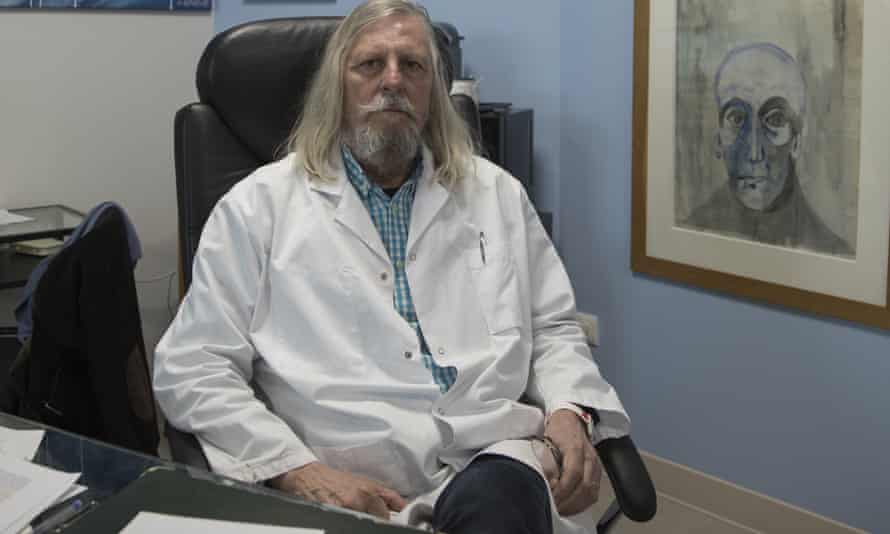A world-renowned Dutch expert in identifying scientific misconduct and error, Dr Elisabeth Bik, has been threatened with legal action for questioning the integrity of a study promoting the drug hydroxychloroquine to treat Covid-19.
The case, filed with the French state prosecutor by controversial infectious diseases physician Dr Didier Raoult, has prompted hundreds of scientists from across the world to publish an open letter calling for science whistleblowers to be protected.
In March 2020, Bik published a blog post analysing a paper led by Raoult. His paper claimed the antimalarial drug hydroxychloroquine was effective in treating Covid infections, especially when given in combination with an antibiotic.
Bik raised questions about the paper’s methodology, including that the researchers had failed to control for confounding factors. In strong clinical trials, the control group (who are given a placebo) and the treatment group (who are given the drug) should be as similar as possible so scientists can be confident any effects are from the medication alone.
Bik pointed out that patients should be of similar age and gender ratio, be equally sick at the start of treatment, and analysed in the same way, with the only difference being whether they received treatment or not. She said the treatment and placebo groups in Raoult’s study differed in important ways that could have affected the results.
Six patients enrolled in the treatment group at the beginning of the study were not accounted for by the end, missing from the data.
“What happened to the other six treated patients?” Bik said.
“Why did they drop out of the study? Three of them were transferred to the intensive care unit, presumably because they got sicker, and one died. It seems a bit strange to leave these four patients who got worse or who died out of the study, just on the basis that they stopped taking the medication … which is pretty difficult once the patient is dead.”

Despite questions being raised by Bik and other scientists, the then US president Donald Trump promoted Raoult’s paper and the use of hydroxychloroquine for Covid, helping the French doctor gain attention.
In July, France’s Infectious Diseases Society filed a complaint against Raoult that said it was unethical to promote hydroxychloroquine during a pandemic given there was little evidence it worked against Covid. The International Journal of Antimicrobial Agents raised similar concerns.
Science is supposedly self-correcting, but has no measures in place to protect whistleblowers. The powerful editors and heads of institutions will just sue the people who call them out for integrity issues.
— Elisabeth Bik 💉 💉 (@MicrobiomDigest) April 29, 2021
Evidence from multiple strong and properly conducted studies has since found hydroxychloroquine has little to no impact on illness, hospitalisation, or death from Covid.
Bik, who is hired as a consultant by scientific institutions worldwide to analyse data and identify research misconduct, went on to identify image duplication and potential ethical issues in 62 published articles from Raoult and his institute.
Raoult and his supporters have relentlessly attacked Bik since, calling her a “nutcase” and a “failed researcher” on Twitter and in media interviews, and publishing her contact details online. This is despite Bik also exposing errors in papers that found hydroxychloroquine provided no benefit to Covid patients.
Raoult’s colleague, Prof Eric Chabriere, revealed on Twitter that he and Raoult have filed a complaint against Bik and Boris Barbour, who helps run a not-for-profit website called PubPeer which allows scientists to analyse and provide feedback on each other’s work.
The legal complaint alleges harassment over Bik exposing data errors on PubPeer, and extortion because she has a Patreon account where people can donate to her work. She has responded to Raoult’s calls on Twitter to declare who is funding her by sharing links to her Patreon.
Lonni Besançon, a French postdoctoral research fellow at Monash University in Australia, said he had also received multiple death threats from Raoult’s supporters after raising concerns about Raoult’s work.
“But the attacks I get as a white man are a fraction of what women researchers and researchers of colour get,” he said.
Terrible. This lawsuit against Dr. Bik and the administrator of PubPeer is intended to silence public peer review. Scientists should not be punished civilly or economically for documenting problems with research that most charitably can be described as deeply flawed. https://t.co/iK48NMVhZl
— Dr. Angela Rasmussen (@angie_rasmussen) April 30, 2021
He and other international scientists have published an open letter calling for the attacks on Bik to stop and for the scientific community to support her and other whistleblowers. As of Saturday it had more than 500 signatories.
“Scholarly criticism, particularly on issues of research integrity, is fraught with challenges,” the letter said.
“This makes it particularly important to maintain focus on addressing such critique with scientific evidence and not attacks on people’s appearance, character, or person.”
Bik was recognised internationally for conducting work “instrumental to ethical, sound, and reproducible research, but it also introduces her to personal risk as a whistleblower”.
“For several months, Raoult and some members of his institute have responded by insulting her on national television, disclosing her personal address on social media, and threatening legal action for harassment and defamation.
“Prof Raoult and his team’s behaviour toward Dr Bik and others have been pointed out by many international media outlets … This strategy of harassment and threats creates a chilling effect for whistleblowers and for scholarly criticism more generally.”
Guardian Australia has contacted Raoult for comment.
Besançon said institutions and policymakers needed to act to protect whistleblowers like Bik, saying the threats against her had become “ridiculous”.
“We also want citizens and scientists who might try to sue whistleblowers to understand that it’s not a legal concern but a scientific one,” he said. “Dr Bik is an amazing scientist and we want to make sure that no dangerous precedent is set with the current legal situation around her.”
This content first appear on the guardian
